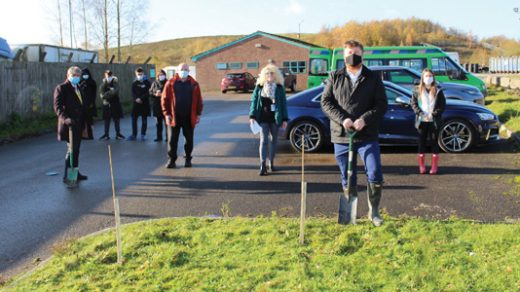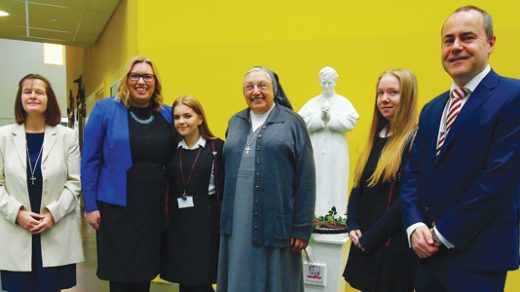Education experts across the UK respond to King’s Speech

Education experts across the country have responded to yesterday’s King’s Speech.
King Charles III announced draft laws in his speech written by the newly-elected Labour government. He said: “Measures will be brought forward to remove the exemption from Value Added Tax for private school fees, which will enable the funding of six and a half thousand new teachers.”
He announced the Skills England Bill, saying: “My government will establish Skills England which will have a new partnership with employers at its heart, and my ministers will reform the apprenticeship levy.”
Responding to the King’s Speech, National Foundation for Educational Research (NFER) chief executive, Carole Willis, said: “NFER welcomes today’s announcement which includes a raft of education policies to tackle challenges in the sector.
“Making teacher recruitment and retention an urgent policy priority, and outlining a strategic approach to provide funding to recruit 6,500 new teachers to the sector, will help ensure a high-quality education for children and young people is delivered.
“Our research shows that currently too many people will not have the essential employment skills that employers need for the future. We hope that the establishment of Skills England will help to address this.
“Reforming the apprenticeship levy is necessary, as our research indicates that the current design of the apprenticeship levy cannot accommodate a large increase in apprenticeship starts among SMEs.”
Nichola Hay MBE, director of apprenticeships policy and strategy at BPP Education Group, also spoke on the apprenticeship levy, saying: “It’s positive to see skills policy central to the government’s plans for growth, with the announcement of a new ‘skills bill’ to replace the apprenticeship levy.
“There’s no denying the apprenticeship levy has been a success over the years. But it lacked some of the flexibility employers and learners needed to truly deliver for businesses.
“The launch of the new growth and skills levy will hopefully provide that, but the government must ensure it consults with employers and training providers to make sure the levy supports the workforce needs and provides opportunities for learners of all ages and skill level.
“To achieve that, it’s important that flexibility within the levy is prioritised, by taking time to review modularisation, content and duration of the apprenticeship.”
EngineeringUK’s head of policy and public affairs, Beatrice Barleon commented: “We welcome the creation of Skills England and the strategic approach to identifying and meeting skills needs.
“We look forward to working with Skills England and other stakeholders on developing a comprehensive workforce and training plan for the engineering and technology, to ensure that the sector, and indeed the entire economy, can thrive with a highly trained and adaptable workforce.
“The ambition to ‘raise educational standards and break down barriers to opportunity’ is something we at EngineeringUK have been calling for. As the King outlined, the urgency of the climate challenge creates new job opportunities, many of them in engineering and technology.
“A greater pre-apprenticeship offer will help, but the funding system must also lead to more opportunities for young people to access Level 2 and 3 apprenticeships. We look forward to working with the government to achieve this and deliver on its ‘youth guarantee’.”
The Children’s Wellbeing Bill was also announced, which is hoped to ‘raise standards in education and promote children’s wellbeing’.
The government said the bill will remove barriers and opportunities for children and their family by strengthening multi-agency child protection and safeguarding arrangements; requiring free breakfast clubs in every primary school, and bringing down costs for children accessing sport and other school activities.
Elaine Hindal, chief executive of the British Nutrition Foundation, said: “We urgently need action to improve children’s health and ensure that every child can thrive. We welcome this commitment to improving children’s wellbeing and we hope this is the beginning of a journey to tackling health inequalities and providing opportunities for all children.”
Responding to the topic of the Children’s Wellbeing Bill, Dani Payne, senior researcher at Social Market Foundation, said: “The introduction of a bill to support children’s wider wellbeing is welcome news: social, physical and mental wellbeing matters for learning and are barriers to academic success for many young people, and it is right that any government should prioritise this.
“What is actually included in the bill, however, feels fragmented and disconnected from the bill’s purported broader goal.
“The inclusion of legislation on children registers, inspections of independent schools, teacher misconduct, SEND inclusion, and the national curriculum are good individually but collectively fall short of a serious mission to tackle child wellbeing.
“This grab-bag approach of reforms may also pose challenges to Labour later on, risking lots of amendments and a fragmented debate. The missing piece of the puzzle is arguably poverty: you cannot keep children safe and happy without tackling child poverty, which now sits at an all-time high with 30% of children living in poverty.
“The national debate on the two-child benefit cap has been prominent in the lead up to the speech and feels even more disappointing in light of this bill.”
Paul Whiteman, general secretary of the school leaders’ union NAHT, said: “The measures set out in the Children’s Wellbeing Bill are largely sensible and welcome. After several aborted attempts at education bills over the last decade, it is good to see the government is not just starting to restore education as a national priority, but also focusing on a number of very practical, specific policies – many of which we have long called for.
“We have been clear about the need for a register of children not in school, which is vital to help services including schools ensure pupils stay safe and are not lost outside the system meaning they miss out on the education they need. Teachers and leaders will be relieved that a government is finally taking action on this.
“The legislation to ensure any new teacher has or is working towards qualified teaching status will put an end to the degradation of the profession that happened under the last administration and helps signal a clear reset of the government’s relationship with the profession.”
Image credit: His Majesty King Charles III reception for Heads of State and overseas visitors by Fergus Burnett under CC BY-NC 2.0







